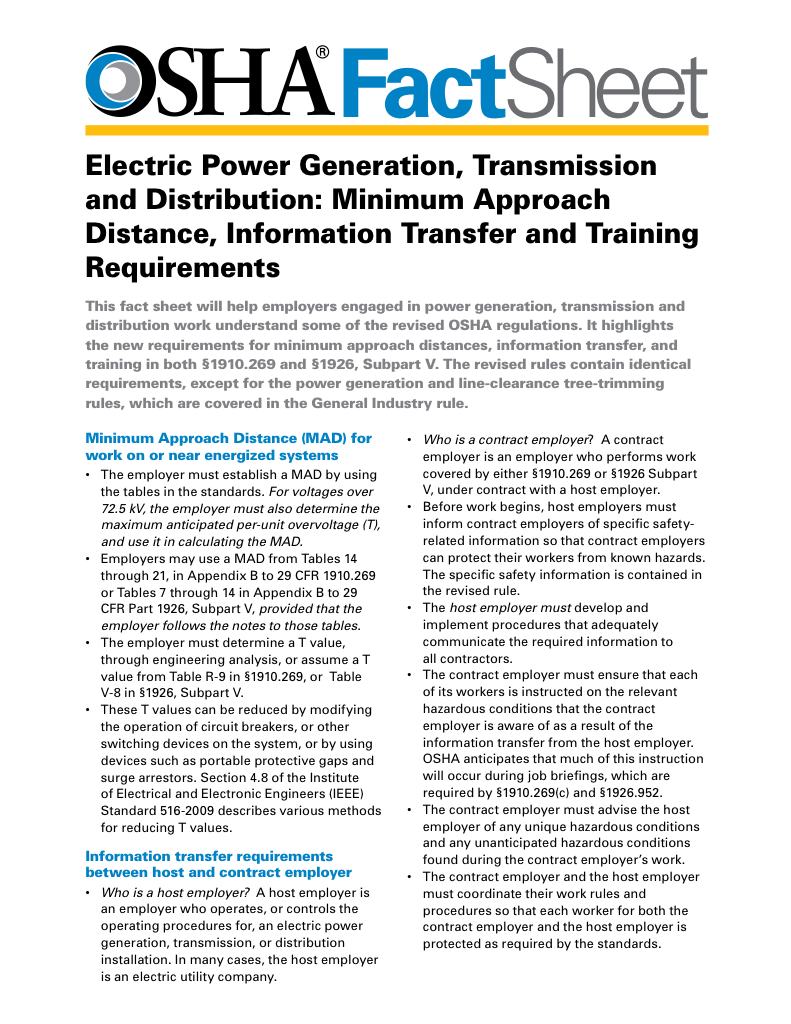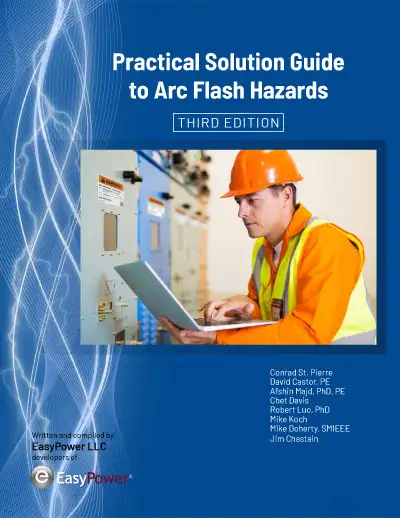Low Voltage Certification Explained
By R.W. Hurst, Editor
NFPA 70e Training
Our customized live online or in‑person group training can be delivered to your staff at your location.

- Live Online
- 6 hours Instructor-led
- Group Training Available
Download Our OSHA 3873 Fact Sheet – Minimum Approach Distance and Training Requirements

- Calculate MAD using voltage and overvoltage values
- Ensure proper communication between host and contract employers
- Meet OSHA training requirements for qualified electrical workers
Low voltage certification is formal training that qualifies workers to work on electrical systems under 750 volts safely. It covers safety procedures, regulatory standards like NFPA 70E, and hands-on practices to prevent electrical shock and arc flash incidents.
Why is Low Voltage Certification Important?
✅ Reduces risk of electrical shock and arc flash
✅ Meets NFPA 70E and OSHA compliance standards
✅ Required by many employers and jurisdictions
✅ Demonstrates professional competency and readiness to meet state requirements
Low voltage certification is a credential that verifies an electrician or technician has completed specific training to work safely around electrical systems typically rated under 750 volts. This includes commercial lighting, control panels, communication equipment, and specialized low-voltage systems such as fire alarm systems, access control systems, intrusion systems, and video security systems. For a clear overview of concepts that underpin low-voltage work, start with NFPA 70E and complement it with our focused guide to low voltage certification.
Understanding Low Voltage Certification
Low voltage certification represents a professional standard for safety and technical proficiency in systems operating under 750 volts. It confirms that workers understand the hazards associated with energized systems and have been trained in approved safety practices, including arc flash prevention, proper PPE use, and lockout/tagout procedures.
Low voltage certification ensures both compliance with regulatory standards and a demonstrated ability to apply them in the field. In an industry where even minor mistakes can result in severe injury or costly downtime, formal training provides an essential safeguard for both workers and employers. To prepare technicians for energized tasks under 750 volts, pair foundational electrical safety with role clarity in qualified electrical worker requirements.
Test Your Knowledge About Arc Flash!
Think you know Arc Flash? Take our quick, interactive quiz and test your knowledge in minutes.
- Instantly see your results and score
- Identify strengths and areas for improvement
- Challenge yourself on real-world electrical topics
Who Needs Certification?
This low voltage certification applies to anyone involved in the installation, maintenance, or servicing of low-voltage systems. Electricians, HVAC technicians, facility maintenance staff, and controls specialists all benefit from this qualification. It’s especially valuable for professionals working with building automation, security, and communications systems, including video surveillance, intrusion detection, and access control technologies.
Employers often require low voltage certification to verify that workers understand proper procedures for working safely with energized equipment and can comply with OSHA and NFPA standards. For distance and approach rules referenced in most certification curricula, study the limited approach boundary and how it integrates with broader NFPA 70E approach boundaries.
Training and Course Content
-
Low voltage certification programs combine classroom theory with hands-on instruction. Training typically covers:
-
Voltage classifications and shock boundaries
-
Arc flash awareness, PPE selection, and safety protocols
-
Lockout/Tagout procedures for energized systems
-
Proper use of electrical testing instruments
-
Grounding, bonding, and overcurrent protection principles
Many programs align with NICET certification pathways, reinforcing practical and theoretical knowledge while preparing professionals for long-term career development. By the end of training, participants are expected to be able to identify hazards, interpret wiring diagrams, and implement safety controls in live electrical environments. If you’re building a compliant training plan, review 70E training alongside specific arc flash training requirements to align coursework with workplace hazards.
-
Steps to Obtain Low Voltage Certification
Earning low voltage certification follows a structured process that blends education, practical experience, and examination:
-
Education: A high school diploma or GED is typically required, with coursework in math and science providing a solid foundation.
-
Meet Local Requirements: States and municipalities may have unique age, experience, or licensing prerequisites.
-
Hands-On Training or Apprenticeship: Working under a master electrician or through a vocational program helps build real-world experience.
-
Work Experience: Many states require candidates to complete multiple years of fieldwork before they can sit for an exam.
-
Examination: Most states administer the C-7 Low Voltage Systems Exam or Class C-R Low Energy FSR Certification to evaluate technical and safety competence.
-
Licensing: After passing, applicants apply through their state licensing board, submitting documentation of experience, scores, and references.
Certification and Regulatory Bodies
Several organizations oversee low voltage certification, ensuring national consistency and high professional standards. The National Electrical Contractors Association (NECA) offers advanced training programs and safety credentials. The International Brotherhood of Electrical Workers (IBEW) offers apprenticeship programs that combine classroom instruction with supervised on-the-job training. In addition, state licensing boards establish legal requirements for certification, administer exams, and issue licenses to qualified applicants.
Exam Focus Areas
Low voltage certification exams are designed to validate a technician’s comprehensive understanding of low voltage work. Common topics include:
-
Electrical Theory: Current, voltage, resistance, and power fundamentals.
-
System Components: Wires, connectors, sensors, and control devices.
-
Installation Practices: Proper wiring, grounding, and bonding techniques.
-
Safety Protocols: OSHA and NFPA 70E standards for hazard mitigation.
-
Troubleshooting: Diagnostic procedures for system faults and performance issues.
Candidates must demonstrate proficiency in both technical skill and safety judgment before certification is awarded. If you need flexible delivery for teams, consider arc flash training online and verify competence with an NFPA 70E certification pathway.
Professional and Career Benefits
Obtaining low voltage certification provides tangible benefits for electrical professionals. In some states, it’s mandatory for employment, while in others it significantly enhances job prospects. Certified workers are often prioritized for hiring and promotions because they demonstrate a proven commitment to safety awareness and technical expertise.
Certification also enhances job security, as the demand for qualified technicians continues to grow in sectors such as renewable energy, smart building systems, and telecommunications. For many electricians, it serves as a stepping stone toward advanced credentials, such as NICET low voltage certification, which can further enhance earning potential and career mobility.
Core Skills Developed Through Certification
Certified electricians and low voltage specialists develop key competencies that set them apart in the field:
-
Technical Skills: Installation, testing, and maintenance of low voltage systems.
-
Problem-Solving: Efficiently diagnosing and resolving system malfunctions.
-
Communication: Collaborating effectively with project managers, engineers, and clients.
-
Attention to Detail: Ensuring all work complies with specifications and code.
-
Safety Mindset: Applying hazard controls and PPE practices consistently.
These skills are reinforced through ongoing education, field experience, and adherence to established electrical safety standards.
Sign Up for Electricity Forum’s Arc Flash Newsletter
Stay informed with our FREE Arc Flash Newsletter — get the latest news, breakthrough technologies, and expert insights, delivered straight to your inbox.
Conclusion
Low voltage certification is more than a credential—it’s a professional commitment to safety, compliance, and excellence. Electricians and technicians who pursue certification gain both the competence and confidence to perform complex electrical tasks in accordance with national standards.
By meeting the necessary training, experience, and testing requirements, certified professionals position themselves for career advancement and long-term success in the evolving electrical industry. Whether working in building automation, telecommunications, or industrial environments, certified low voltage specialists play a vital role in maintaining safe and efficient electrical systems.
Frequently Asked Questions
What qualifies as low voltage?
Low voltage typically refers to systems operating under 750 volts, including lighting, control panels, security systems, and telecom lines.
Is low voltage certification mandatory?
Certification is not always legally required, but many employers and jurisdictions demand proof of training for compliance and safety assurance. State requirements may apply.
How long does low voltage certification training take?
Courses range from 4 to 8 hours depending on depth. Some include both classroom instruction and hands-on practice with tools and PPE, while others involve longer-term technical training or trade school programs.
Does NFPA 70E apply to low voltage work?
Yes. NFPA 70E safety standards apply to all energized electrical work, including low voltage, and require hazard assessments and protective measures.
Related Pages








